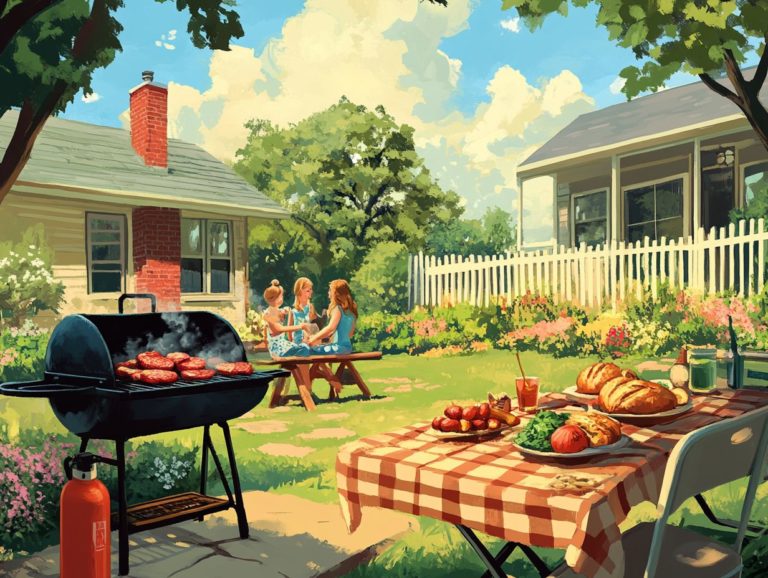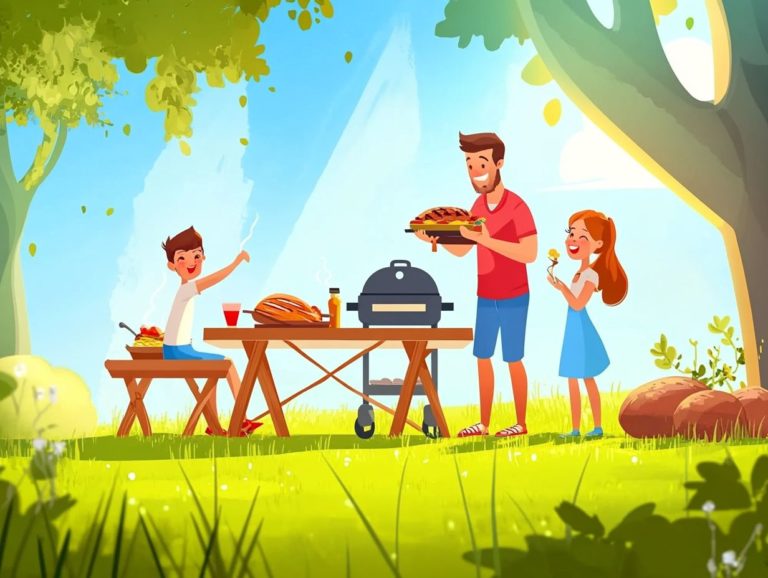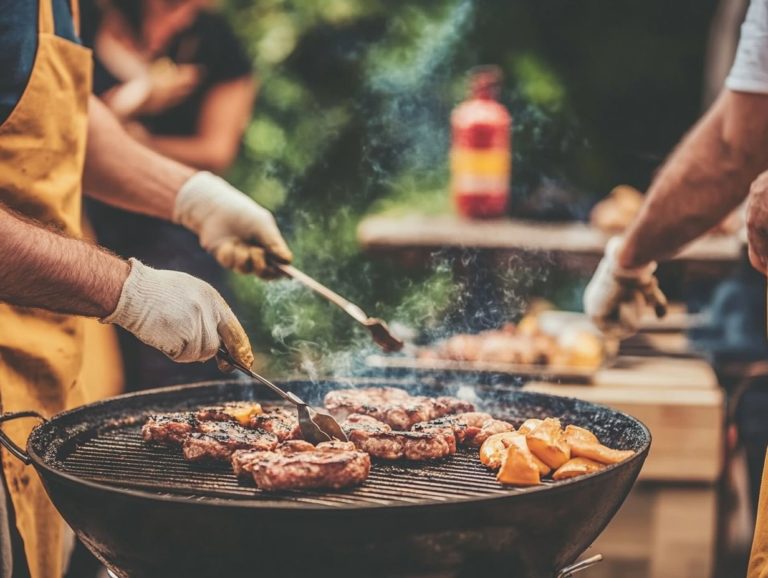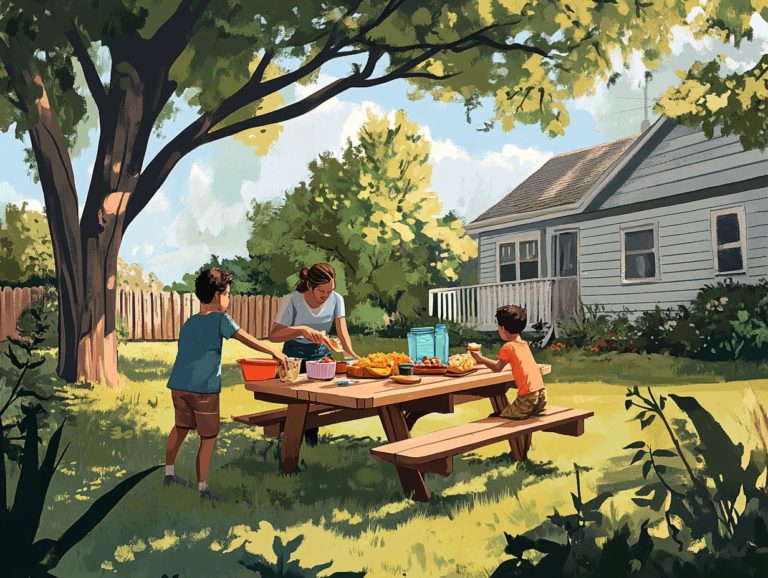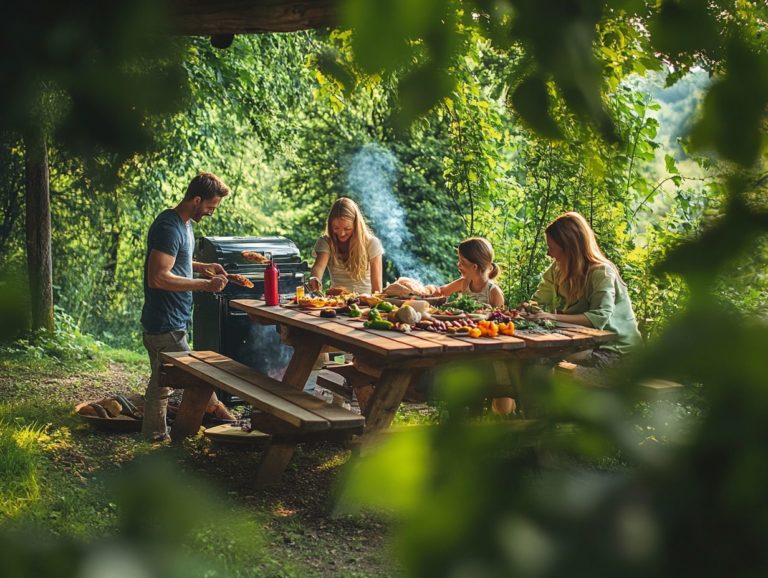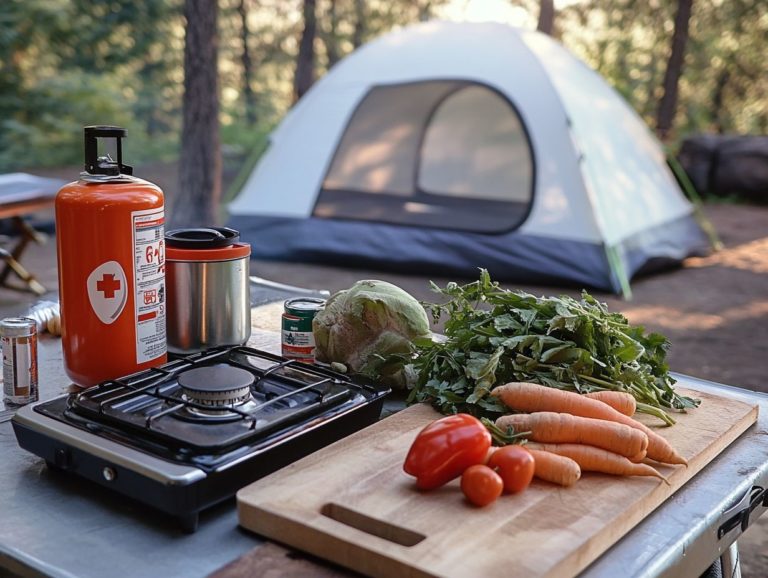Outdoor Cooking Safety: Weather Considerations
Cooking outdoors can be a truly enjoyable experience. However, it does bring its own unique set of challenges, particularly when it comes to the weather.
Whether it’s unexpected rain, gusty winds, or sweltering heat, various elements can impact not only your cooking process but also your safety.
Get ready to dive into the exciting world of outdoor cooking safety! We’ll cover weather tips, essential gear, and effective safety measures.
Embrace your outdoor culinary adventures with confidence and peace of mind!
Contents
- Key Takeaways:
- Weather Considerations for Outdoor Cooking
- Preparing for Different Weather Conditions
- Safety Measures for Cooking in Extreme Weather
- Tips for Safe Outdoor Cooking
- Frequently Asked Questions
- What are some weather considerations to keep in mind for outdoor cooking safety?
- How does wind affect outdoor cooking safety?
- Should I still cook outdoors if it is raining?
- What safety precautions should I take when cooking in hot weather?
- What should I do if I hear thunder while cooking outdoors?
- Do I need to take weather conditions into account when storing outdoor cooking equipment?
Key Takeaways:
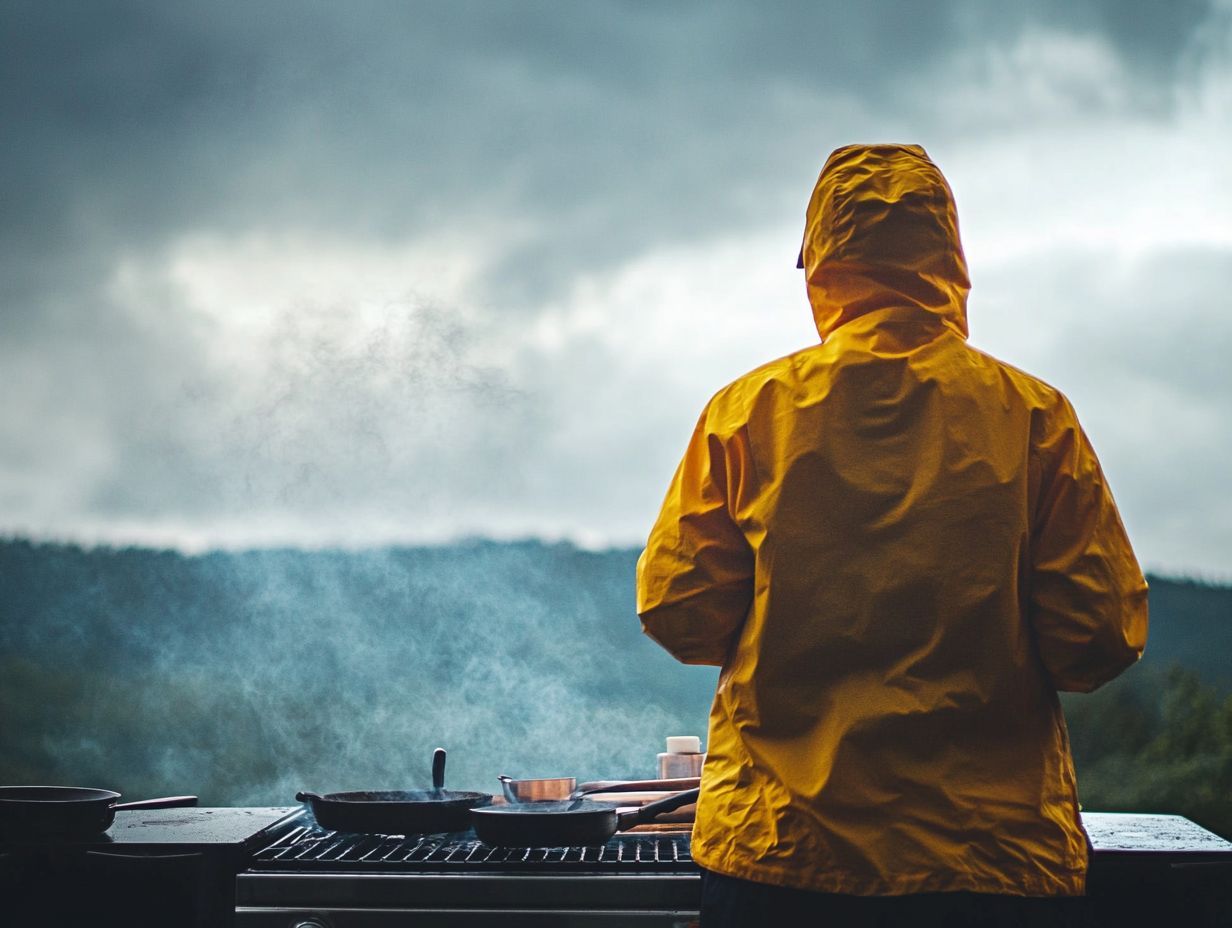
- Always check the weather forecast before cooking outdoors to prepare for potential hazards.
- Invest in the proper gear to safely cook in different weather conditions such as rain, wind, and extreme heat.
- Take safety measures in extreme weather; seek shelter during storms and use heat-resistant materials in high temperatures.
The Importance of Safety in Outdoor Cooking
The significance of safety in outdoor cooking cannot be emphasized enough. This is especially true during summer camping trips when families gather around campfires for delightful meals.
To create a safe cooking environment, keep a well-stocked first aid kit close at hand. This will help address any minor mishaps that may occur while preparing your delicious fare.
Utilizing a meat thermometer ensures that every meal reaches the appropriate temperatures. This dramatically reduces the risk of foodborne illnesses. By practicing good hygiene washing your hands regularly and preventing cross-contamination you can further elevate food safety.
Campfire safety is essential. Sticking to designated fire pits minimizes the risk of wildfires. Additionally, opting for local firewood helps keep harmful pests at bay.
By taking these precautions and having emergency plans in place, you enhance your culinary experiences and cultivate a secure atmosphere for everyone involved.
Weather Considerations for Outdoor Cooking
Weather considerations are vital when it comes to outdoor cooking, as they shape everything from your choice of equipment to the safety measures necessary for cooking in windy conditions during a successful summer camping trip.
Recognizing how elements like rain, wind, and sweltering heat can affect your cooking experience is key to ensuring both safety and enjoyment while outdoor grilling. For additional guidance, consider these safety tips for cooking with open flames outdoors.
Whether you opt for a charcoal grill or a gas grill, being mindful of fire weather and potential hazards will help you create a memorable culinary adventure without sacrificing safety.
Factors That Can Affect Outdoor Cooking
Several environmental factors can significantly impact your outdoor cooking experience, including temperature, wind, and humidity. Each plays a unique role in the success of your culinary endeavors while camping.
Understanding how these elements influence cooking times and food safety practices is essential for achieving perfect grilling results and avoiding foodborne illnesses. Adapt your cooking methods to the weather to enhance your summer camping experience and ensure safe food preparation.
For instance, high temperatures can speed up cooking but come with risks if you’re not attentive. This could lead to overcooked or unevenly prepared meals. Wind can disrupt your flames and create uneven heating, so you may need to adjust your techniques by using windbreaks or repositioning your grill.
Increased humidity can affect cooking speed and food preservation, making it vital to keep perishable items cool.
Regularly checking internal temperatures with a food thermometer is crucial to guarantee that meats reach a safe temperature of 165 F or higher. Always have a solid plan in place, including portable refrigeration for both raw and cooked items, to keep everyone safe and satisfied during your outdoor adventures.
Preparing for Different Weather Conditions
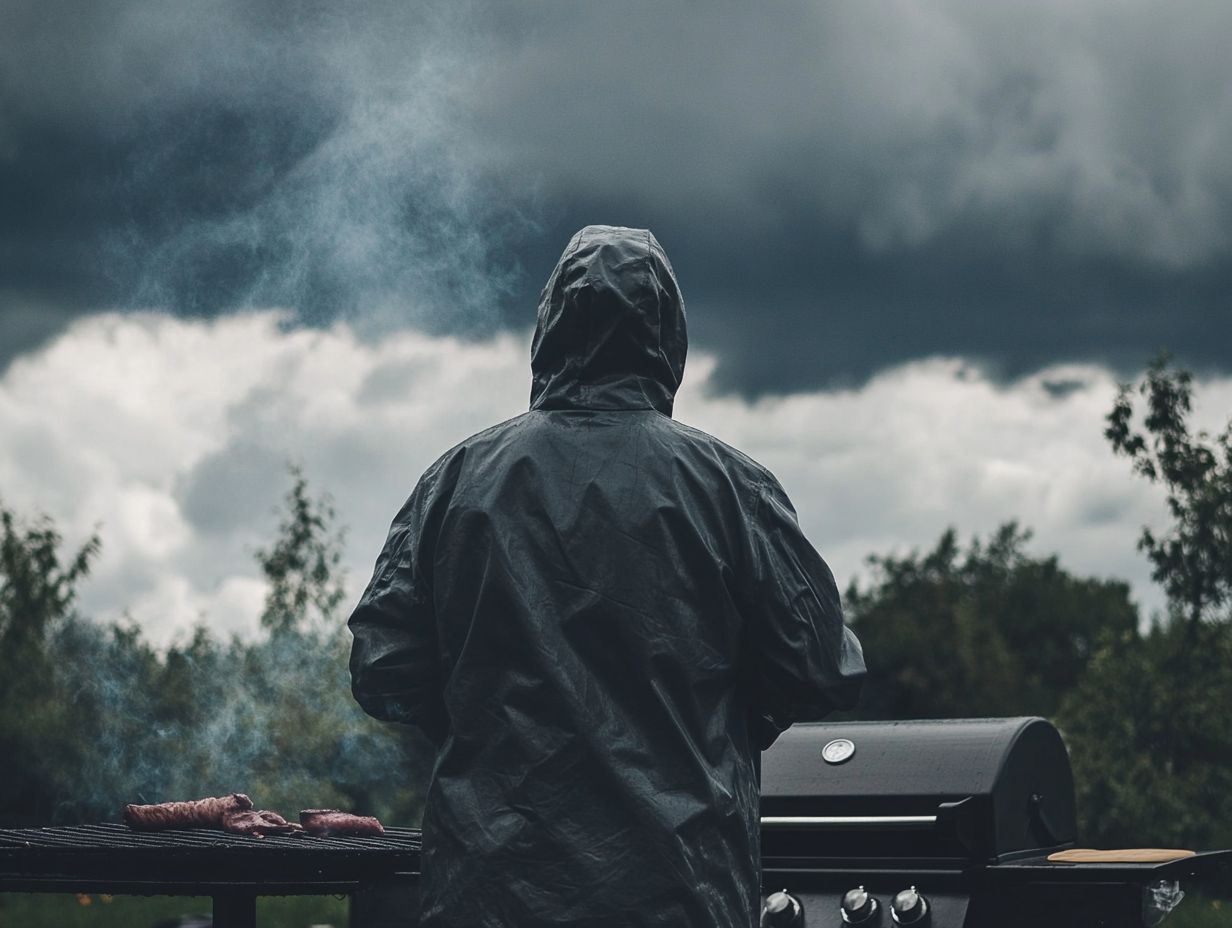
Preparing for various weather conditions is crucial for a successful outdoor cooking experience during your summer camping trips. Unexpected changes can arise at any moment. Whether it s heavy rain or strong winds, having the right gear and equipment can transform your outdoor meals from a potential hassle into a delightful affair.
By planning ahead and choosing versatile cooking tools, you can easily adjust your culinary plans to accommodate shifting environmental conditions. This ensures that safety and enjoyment remain at the forefront for everyone involved.
Proper Gear and Equipment for Rain, Wind, and Heat
Selecting the right gear and equipment for outdoor cooking in rain, wind, and heat is essential for ensuring safety and creating enjoyable culinary experiences during your summer camping trips.
The unpredictable nature of outdoor conditions can swiftly transform a delightful cookout into a frustrating ordeal if you re not adequately prepared. When planning your meals, having waterproof tarps is vital, providing essential coverage for food preparation areas to keep everything dry. Meanwhile, sturdy windbreaks can shield you from sudden gusts that threaten to disrupt your grilling activities.
On those hotter days, insulated containers become invaluable allies, helping to keep perishable items at safe temperatures and reducing the risk of foodborne illnesses. Using these carefully chosen tools enhances your cooking experience and elevates your entire outdoor adventure.
Safety Measures for Cooking in Extreme Weather
Implementing safety measures for cooking in extreme weather is essential to protect yourself and your fellow campers from potential hazards. This ensures that outdoor cooking remains a delightful experience. Whether you’re contending with strong winds, sudden storms, or sweltering heat, adhering to safe food handling tips gives you the power to mitigate the risks associated with fire hazards and foodborne illnesses.
By preparing thoroughly and understanding the unique challenges that extreme weather presents, you can elevate your safety awareness and savor successful outdoor cooking adventures.
Dealing with Storms, High Winds, and Heatwaves
Dealing with storms, high winds, and heatwaves demands specific strategies to ensure your safety while cooking outdoors, especially during those summer camping trips. It’s essential to understand safety tips for cooking on a budget outdoors to securely manage your cooking setup against strong winds, protect your food from storm-related hazards, and maintain proper cooking temperatures during heatwaves.
When planning your outdoor meals, remember to monitor the weather conditions regularly. Stay alert for any approaching storms. Additionally, preparing for emergencies while cooking outdoors by securing your cooking equipment, like stowing away lightweight items and anchoring heavier apparatuses, can prevent accidents from sudden gusts.
Use cooler packs or insulated containers to keep perishables safe from heat. Adapting your cooking times to early morning or late evening helps manage heat stress effectively. Having a reliable source of communication as part of your emergency preparedness plan will also give you peace of mind during unpredictable weather conditions.
Tips for Safe Outdoor Cooking
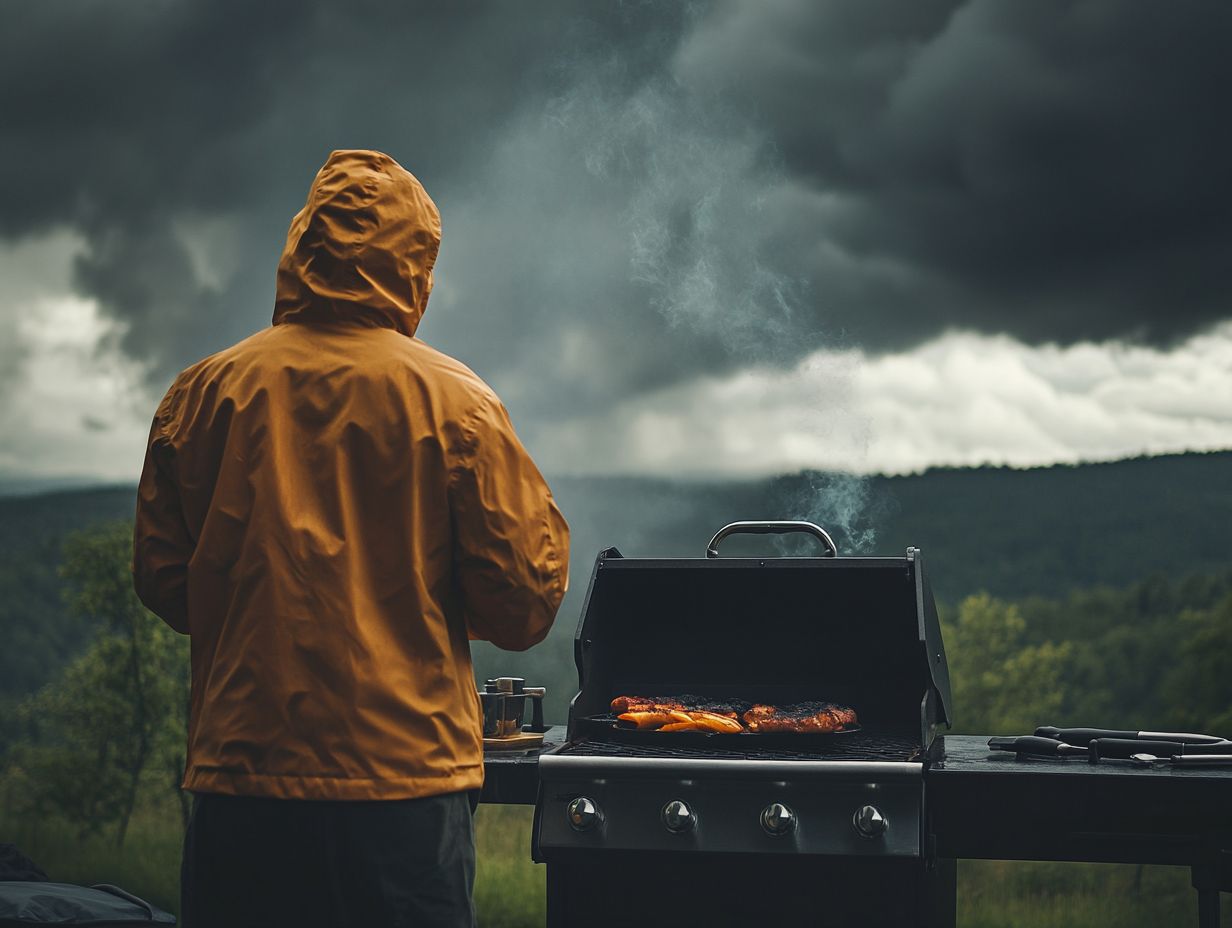
Follow these exciting tips for safe outdoor cooking to make your camping experience unforgettable while minimizing the risks of foodborne illnesses and injuries. By adhering to safety guidelines and practicing proper food hygiene, you can effectively manage cooking temperatures and avoid mixing raw and cooked foods, which can cause illness.
These essential tips not only foster a secure environment for grilling and meal preparation but also help create cherished memories with family and friends.
Are you ready to face the elements? Get ready for an amazing outdoor cooking adventure today!
General Safety Guidelines for Outdoor Cooking
General safety guidelines for outdoor cooking are essential for ensuring a delightful camping experience. These guidelines emphasize proper sanitation and safe food handling. They offer key practices for using cooking equipment, managing food safely, and maintaining hygiene standards while preparing meals in the great outdoors.
Be mindful of how you use grills and stoves to significantly reduce fire hazards. Prioritize food safety practices, like washing your hands with soap before and after handling ingredients. Keep surfaces and cooking utensils impeccably clean.
Safe food storage is essential; ensure meats are kept at appropriate temperatures to prevent spoilage. Remember, leftovers should never linger outdoors for too long. Familiarize yourself with your surroundings and keep a watchful eye on children near cooking areas to help prevent potential injuries. This way, everyone can savor their culinary adventures outdoors without a hitch.
Frequently Asked Questions
What are some weather considerations to keep in mind for outdoor cooking safety?
Check for any weather warnings or advisories before starting outdoor cooking. Pay attention to factors like wind speed, temperature, and potential storms. To ensure a safe experience, refer to essential tips for outdoor cooking and have a first aid kit on hand for emergencies to avoid injuries.
How does wind affect outdoor cooking safety?
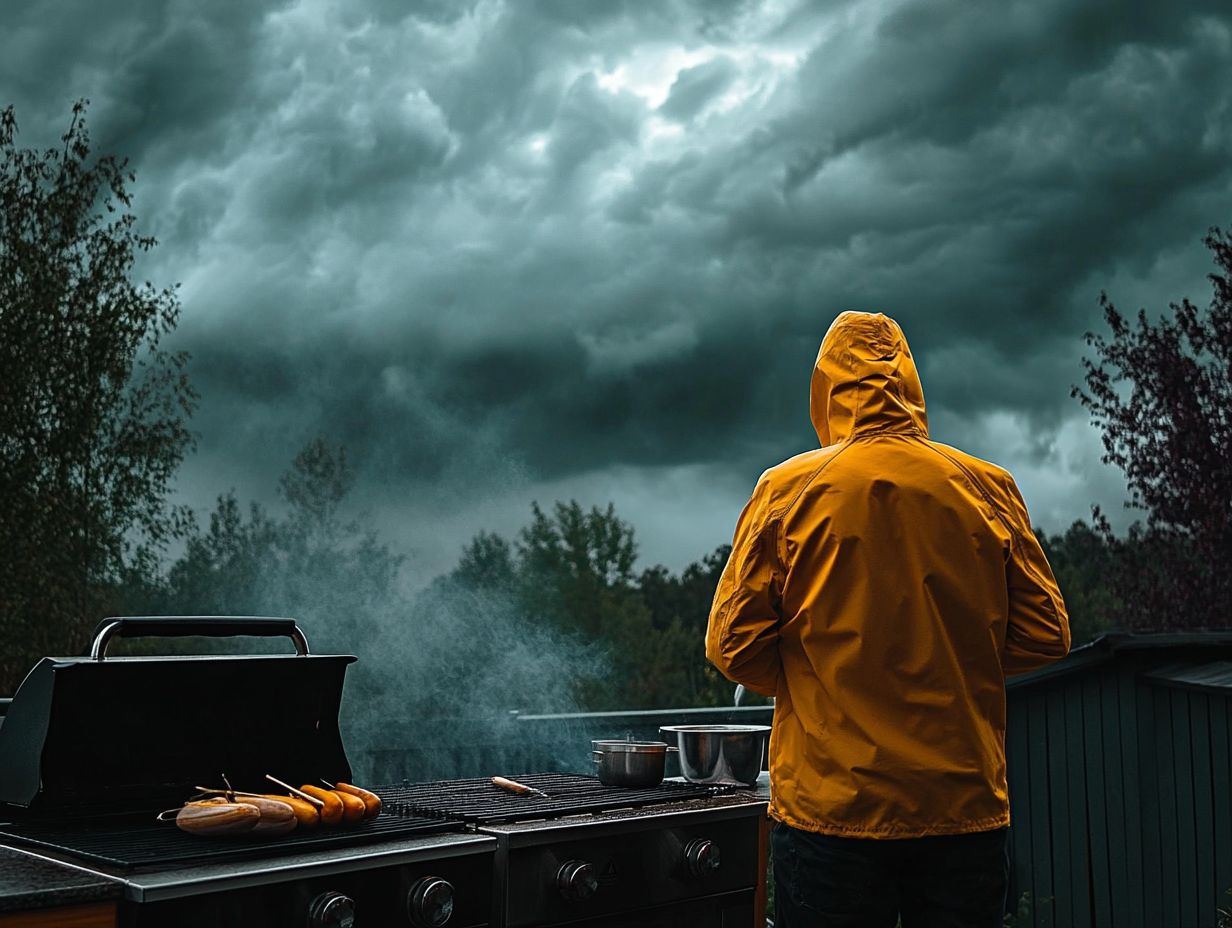
Strong winds can be dangerous for outdoor cooking as they can blow flames or hot coals, potentially causing fires or burns. To ensure safety, position the grill or stove in a sheltered area to minimize wind impact and consider looking into best practices for outdoor cooking safety, such as using a charcoal or gas grill.
Should I still cook outdoors if it is raining?
It is generally not recommended to cook outdoors in the rain, as it can complicate the cooking process and increase the risk of accidents. If you must cook in the rain, use a shelter or umbrella to protect the flames and practice proper sanitation to avoid contamination.
What safety precautions should I take when cooking in hot weather?
In hot weather, stay hydrated and take breaks from standing over a hot grill or stove. Keep a first aid kit on hand for burns or other injuries, and minimize handling hot objects with gloves or utensils to prevent foodborne illnesses.
What should I do if I hear thunder while cooking outdoors?
Stop cooking right away if you hear thunder your safety comes first! Seek shelter indoors, avoid using metal utensils or touching metal objects, and do not resume cooking until at least 30 minutes after the last clap of thunder.
Do I need to take weather conditions into account when storing outdoor cooking equipment?
Yes, it is important to properly store outdoor cooking equipment when not in use, especially during extreme weather. Secure or cover equipment to protect it from wind, rain, or other elements. Consider safe storage solutions like a bear box (a sturdy container to keep food safe from wildlife).
Follow these tips to ensure a safe and enjoyable cooking adventure outdoors!

